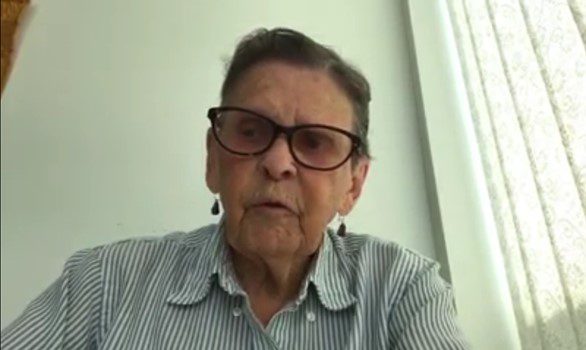Lois Wilson, former senator and the first female moderator of the United Church, believes that the COVID-19 pandemic has provided Canada with a window of opportunity for implementing a permanent guaranteed livable income program.
“The federal government has been very good at supporting people in all sorts of ways through CERB [the Canada Emergency Response Benefit] and so on, but they’re not permanent,” Wilson said. “And it seems to me that they’ve got all their building blocks in place, and just put them all together and make this a permanent policy for across Canada and link it to the tax roll.”
The United Church of Canada has been advocating for a guaranteed livable income for quite some time, but the pandemic has only increased the financial burden many face in their everyday lives. Since last year, those meeting the qualifications have been able to collect the Canada Emergency Response Benefit (CERB).
In an effort to raise awareness for the need for a guaranteed livable income, members of The United Church of Canada held over 40 vigils across the country on April 8, the same day as the Liberal National Convention begins. A caucus-sponsored motion about universal basic income is on the table at the event. Due to the stay-at-home order in Ontario, many vigils were held online via Zoom.
The virtual vigil for Deputy Prime Minister Chrystia Freeland’s Toronto riding was organized by Mary Sanderson, a member of Bloor Street United, Barry Rieder, of the Jane-Finch Community Ministry, and Rev. Susan Eagle, a minister from Barrie.
Originally, there was going to be an in-person demonstration outside of Freeland’s office, but organizers still found ways to get the word out. A letter outlining the goals for a guaranteed livable income was sent to the prime minister and Freeland. Several of the vigils were also recorded and posted online.
More on Broadview:
- How to settle family disputes about COVID-19 at a distance
- In a historic first, United Church General Council drops in-person meeting for 2022
- United Church hires anti-racism and equity officer
During the event, designated speakers associated with various churches spoke about what a guaranteed livable income meant to them.
Chief financial officer of The United Church of Canada, Erik Mathiesen, spoke after the vigil about why he feels so strongly about the issue.
“Quite simply, I believe that a society as rich as ours could and should be able to eradicate poverty. Market forces alone will never achieve this,” he said. “We need a focus on compassion and the common good. Occam’s razor points me to the simplest bold solution.”
Wilson, who was involved with the vigils since the beginning, said the idea was born out of an acknowledgment that the movement for a guaranteed livable income wasn’t gaining traction. The United Church got into contact with her in September to discuss a new game plan.
“They’d like to try a different model, and that would be networking. So, I got busy to see if I could establish a network of people across the country,” she said.
Wilson, who turned 94 the day of the vigils, is happy with their success.
“They really solidified and made legitimate the whole project in the eyes of the people who participated,” she said. “They began to realize that more than they were just involved. For example, one Zoom call had eight United Church congregations on it. And that took place right across the country.”
At the end of the Toronto vigil, Sanderson lit a candle for people who are living in poverty, and encouraged others to do the same and post a picture of them doing so on social media.
As for what a successful guaranteed livable income program would look like to the United Church, their website conveys what the concept means to them.
“The use of ‘guaranteed’ signals a focus on ensuring a level of income for all. Emphasis is on it’s being available to anyone below a certain income level (universally accessible) rather than necessarily paid out to everyone and then clawed back, which for some is what universal implies. The use of ‘livable’ signals an income that enables people to live with dignity, not just stay alive,” the site states.
***
Brooklyn Patterson is an intern at Broadview.
We hope you found this Broadview article engaging.
Our team is working hard to bring you more independent, award-winning journalism. But Broadview is a nonprofit and these are tough times for magazines. Please consider supporting our work. There are a number of ways to do so:
- Subscribe to our magazine and you’ll receive intelligent, timely stories and perspectives delivered to your home 8 times a year.
- Donate to our Friends Fund.
- Give the gift of Broadview to someone special in your life and make a difference!
Thank you for being such wonderful readers.
Jocelyn Bell
Editor/Publisher


Comments
Sheldon LeGrow says:
A guaranteed national income is a noble aspiration but the difficulty arises when there is no cap or limit on prices. It's like when the minimum wage is increased and the cost of living goes up proportionately; people are still left in the same bind. Rent goes up, the prices in stores go up and so it goes. Having a basic livable income is great if we could guarantee that the cost of living would remain the same.
Replies
Gary says:
Amen
It will be the middle class that gets taxed to death to pay for it. The rich will pitch in the pennies with tax avoidance.
WGNathanie says:
If the GAI fixes the current perceived challenges of cumbersome and costly government administration of EI, CCB, OAS, CPP, and various provincial initiative like Ontario Works, it may be worth pursuing. If GAI is not part of such a strategy and just a feel good tack on, it wont make life better for anyone. it wont be equitable or financially sustainable. And why does GAI have to be 'universal". Why cant it be based on need? Of course the liberal controlled senate sees this an opportune time to push for it. in the meantime Canadian small business owners who don't want GAI but only the right to work are locked out. Good stewardship which I hope is what the church desires requires some non-partisan thinking about how this is best done.
wgnathaniel says:
If the GAI fixes the current perceived challenges of a cumbersome government administration of EI, CCB, OAS, CPP, and various provincial initiative like Ontario Works it may be worth pursuing. If GAI is not part of such a strategy it wont be equitable or financially sustainable. And where is government and social encouragement to work integrated into our social safety net in a universal system? Why cannot GAI be based on need?